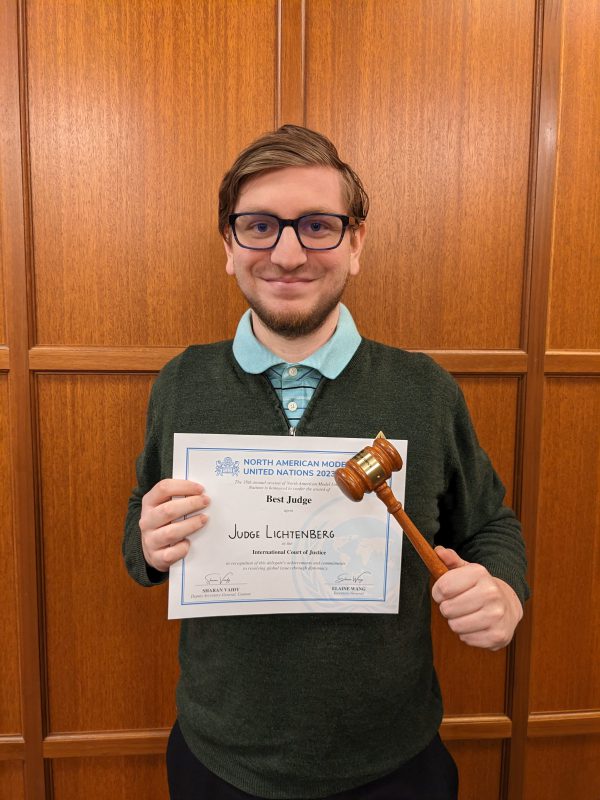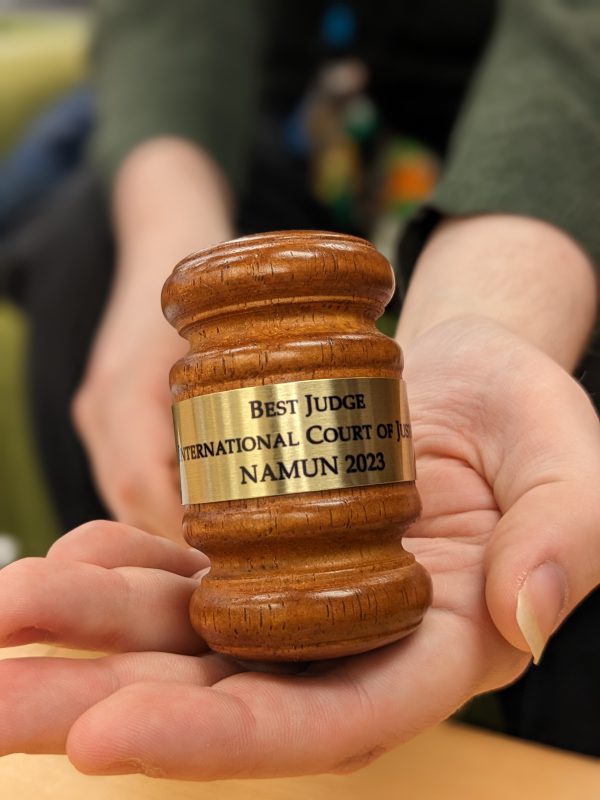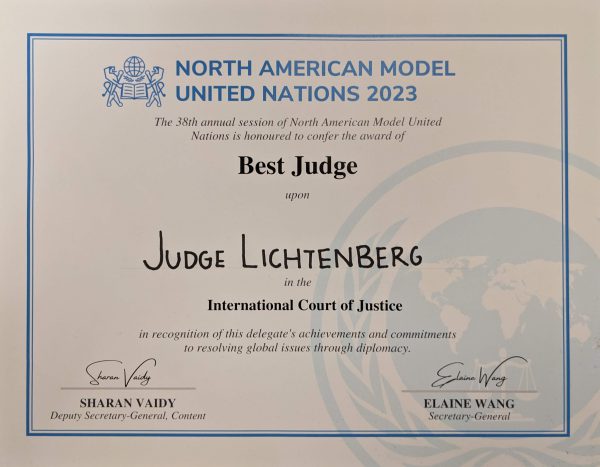Thomas Lichtenberg ’23 was recently honored as Best Judge for his work with the International Court of Justice (ICJ) at the 2023 North American Model United Nations (NAMUN) conference.
The Best Judge award is presented to a participant who has done extensive and complete legal research on the matter at hand, asked excellent questions that contributed significantly to the understanding and verdict of the case, and provided an unparalleled deliberation on the case that takes into account the opinions and ideas of fellow judges while being based primarily on relevant international law, according to NAMUN.
To participate in the ICJ, students must first be nominated by their school’s representative, then be selected based on an application.
Lichtenberg had previously participated in Model UN as a first-year student, attending the Midwest Model United Nations conference in St. Louis in February 2020. There, he participated in a Mars-colonization simulation.
When his classmate and friend Tate Westra, co-president of Model UN at K, invited him to the 2023 conference and offered to nominate him for ICJ, Lichtenberg decided to go for it.
Having completed a summer internship at the 9th Circuit Court in Kalamazoo, Lichtenberg thought it would be interesting to try out the judge role. He was also intrigued by the chance to try something new, as his experiences have focused on civil rights law and the ICJ would be considering a maritime law case.
“Another interesting thing about this committee is that, instead of playing characters like most Model UN simulations do, you don’t have to be someone outside of yourself,” Lichtenberg said. “You aren’t given a background guide to your character, you aren’t thinking about the ways your country, your character is supposed to act. Instead, it’s up to you what your jurisprudence [theory or philosophy of law] is. Also, you’re supposed to be neutral because you’re a judge, so you don’t write the same sort of paper indicating where you’re biased or where you plan to attack. It was a very differently oriented committee to most other Model UN committees, which was interesting to me, so I applied for it. When Tate got the news that I had been accepted, he called me up and said, ‘Congratulations, Judge Lichtenberg.’”
A group of 10 Kalamazoo College students attended the conference Feb. 22-25 in Toronto, leaving campus early that Wednesday morning to beat the ice storm.
The model ICJ was presented with a real case recently decided by the ICJ—in this instance, the territorial and maritime dispute Nicaragua v. Colombia. The case involved conflicts stemming from a 2012 case in which the ICJ drew borders regarding a group of disputed islands.
“Colombia had allegedly violated that ruling by entering Nicaragua’s exclusive economic zone,” Lichtenberg said. “Colombia justified it by saying they were doing so for ecological reasons and that they had an obligation to protect areas that were environmentally at risk. Also, they had evidence that Nicaragua had been violating their territory, so it was an interesting sort of conflict.”
There were supposed to be eight judges on the court, Lichtenberg said; due to the storm, however, only four arrived, one of whom left after two days, leaving only three judges. Despite the small committee, Lichtenberg found the experience rewarding.
“I got to engage a lot with the other judges,” he said. “They had similar ideas of jurisprudence to me, so there wasn’t too much conflict. There was some interesting back-and-forth, though. There was one piece of evidence I wanted to put in submission which the other judges disagreed with, but I think it earned me some points with the chair.
“At the end, I did submit a minor objection to our opinion, where I said, ‘I think this evidence shouldn’t have been suppressed, because we could have strengthened our case for saying the ICJ has jurisdiction over this matter.’ There were interesting semantics of the legal system in play that I had fun with.”
In the role of judge, Lichtenberg said he aspired to balance the formal and technical aspects of knowing and adhering to the law in interpreting a complex case, with a perspective on how social problems can be impacted through jurisprudence.
“For instance, Nicaragua in the case was engaging in diving practices which are environmentally harmful, and we focused on that sort of social implication,” Lichtenberg said. “In a similar lens, we looked at articles in which Colombia’s president was saying, ‘Yes, we violated their territory, and we’ll do it again,’ and how that speaks to the danger of not respecting court rulings, not respecting the rule of law, and making sure people are held accountable.”
The Best Judge award is affirming to Lichtenberg as he looks forward to graduating in June with a dual major in political science and philosophy and attending law school in the fall. He has been offered full tuition to three law schools and is still deciding where he will go.
He is currently wrapping up his Senior Integrated Project on mental health law on college campuses and has one more term as the Civic Engagement Scholar for K Votes. In the meantime, he is enjoying the success of his last Model UN venture.
“Leading K Votes has been a worthwhile yet challenging project, and along with everything else I’ve been doing at K, it was nice to step out of the school environment for a while,” Lichtenberg said. “It was fun for me to return to the court environment, especially because there weren’t as many stakes attached to it as when I was working at the court. I was just having fun with it and then also got to see how I can succeed in this role.”



